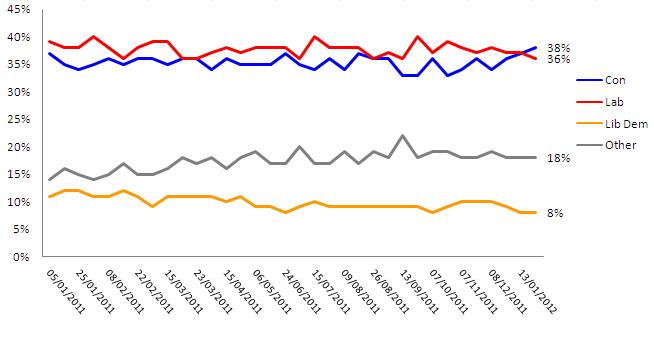Voting Intention – 27th January
27th January 2012
- Since the start of December and the David Cameron?s EU summit veto, we?ve seen a gradual tightening of the Labour lead with both major parties on 37% in the last survey two weeks ago and finally pulling ahead by two percentage points this week.
- Curiously the majority of fieldwork for this poll occurred just as the controversy surrounding Stephen Hester?s £963,000 bonus came to a head. Fieldwork closed on Monday morning, after the RBS boss turned down his payment on Sunday night
- This result, along with a similar improvement in Prime Minister David Cameron?s job approval ratings (results available soon) suggest that the Conservatives are not being particularly damaged by perceptions of extravagance in the financial sector. In fact the Conservatives are still trusted more than Labour on the subject of regulating the financial sector (results available soon)
- For Labour, the counter balance to Ed Miliband?s low job approval rating has been a consistent opinion lead in most polls since the end of 2010. The Labour leader must hope that this Tory surge is a temporary one as basic political science tell us that an opposition party in a country with negligible economic growth, high unemployment and controversial cuts in government spending should have an impressive polling lead.
Topline Voting Intention
| † | % | Change |
| Conservative | 38 | +1 |
| Labour | 36 | -1 |
| Liberal Democrats | 8 | -1 |
| Other parties | 18 | n/c |
Other Parties (breakdown)
| † | % | Change |
| UKIP | 6 | n/c |
| Green | 4 | n/c |
| SNP | 4 | n/c |
| BNP | 1 | -1 |
| Plaid Cymru | 0 | -1 |
| Other | 1 | n/c |

Opinium Research carried out an online survey of 1,958 GB adults aged 18+ from 27th to 30th January 2012. Results have been weighted to nationally representative criteria.
Interview Method and Sample
This survey is conducted online by CAWI (computer aided web interviewing), using Opinium?s online research panel of circa 30,000 individuals. This research is run from a representative sample of GB adults (aged 18+ in England, Scotland and Wales). The sample is scientifically defined from pre-collected registration data containing gender, age (18-34, 35-54, and 55+), region (North East, North West, Yorkshire and Humberside, East Midlands, West Midlands, East of England, London, South East, South West, Wales, and Scotland), working status and social grade to match the latest published ONS figures.
Opinium also takes into account differential response rates from the different demographic groups, to ensure the sample is representative.




